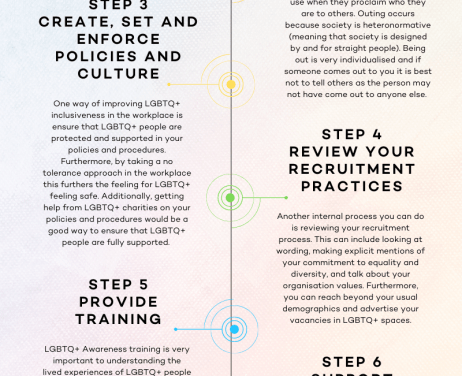On the 28th June 1969 a riot broke out at the Stonewall Inn, an LGBTQ+ pub in New York City. The riot happened because of previous police raids on LGBTQ+ spaces and LGBTQ+ people had had enough. From this riot, a pride movement was born. The Stonewall Riots sparked a shift and growth in LGBTQ activism that increased throughout the decades. We have been successful in gaining LGBTQ+ rights however discrimination still exists for example there is no recognition of intersex people and capital punishment remains in a number of countries.
So how did Pride come to the UK?
Stonewall lit a fire across the western world where LGBTQ+ people were being discriminated against because of their identity. In 1970 the UK had its first pride rally and since then prides have occurred across the country. However, despite the progressions on LGBTQ+ rights in this country, such as the Equality Act (2010) and the Marriage (Same Sex Couples) Act (2013), LGBTQ+ people still face discrimination today.
From Stonewall 2018 report:
- More than a third of LGBT staff (35 percent) have hidden that they are LGBT at work for fear of discrimination.
- Almost two in five bisexual people (38 percent) aren’t out to anyone at work about their sexual orientation, compared to seven percent of gay men and four percent of lesbians. While one in four trans people (26 percent) aren’t open with anyone at work about being trans.
- Almost one in five LGBT staff (18 percent) have been the target of negative comments or conduct from work colleagues because they’re LGBT.
- Almost one in five LGBT people (18 percent) who were looking for work said they were discriminated against because of their identity while trying to get a job.
- One in eight trans people (12 percent) have been physically attacked by customers or colleagues in the last year.
It is for this reason that Prides still exist. Prides offer a safe space for people to be who they are and connect with people like them. It challenges the status quo and raises awareness of the issues LGBTQ+ people face. Pride has and always will be a protest.
Personal Reflection
I have been involved in LGBTQ+ social change movements since 2009 when I came to York for university (York St John University). As a young LGBTQ+ person who experienced bullying because of their sexuality and gender identity, I thought that in moving to York I would find an LGBTQ+ scene and groups for me to be involved in. However, I found this was difficult. I joined York St John’s LGBTQ+ collective (which, at the time, could not be a society because of the Students’ Union’s constitution), and I went on a few LGBTQ+ socials. My course involved placements in the community, from which my local voluntary centre pointed me to the LGBTQ+ Youth Group. That is where I met the chair of the York LGBT Forum. He invited me to a meeting and that started my involvement in creating and managing LGBTQ+ charities.
Before I graduated from York St John University, one of the last things I did as part of the Students’ Union council was to introduce new amendments to the constitution so that the LGBTQ+ collective could become a society. This year I have been asked to be an opening speaker for York St John University’s Social Justice Conference owing to my social justice work in York and elsewhere.
In 2015 York LGBT Forum registered as a charity. We were very conscious about the wellbeing of LGBTQ+ people and the need for a supportive LGBTQ+ community. Therefore, I established the coffee socials and created a Health and Wellbeing Subgroup which is still a core project of the charity. The York LGBT Forum has gone from strength to strength from offering socials, events, 1 to 1 support, gardening projects, training, and much more. The aim is to create an LGBTQ+ community in York where people can receive support and find people like themselves. Owing to this work I was awarded a lockdown hero plaque from York Civic Trust during the Covid-19 pandemic.
Now that I am at Friends Provident Foundation, I am bringing this energy to the Charitable Foundation sector and raising awareness of the lived experiences of LGBTQ+ people. As an organisation that is committed to reforming the economy to create a better world, we must make sure that marginalised groups are included in any changes, and we do not recreate inequality. I therefore urge all new economic thinkers to take an intersectional approach to their work and ideas.
Tips on how to be more LGBTQ+ friendly in the workplace.
-
Don’t make assumptions
I believe this is one of the most important things to debunk. Assumptions are harmful and can cause distress. Just because someone is camp that does not mean they are gay and vice versa. Be kind, be open and ask appropriate questions of others.
-
No outing
Coming outing is a term LGBTQ+ people use when they proclaim who they are to others. Being out is very individualised and if someone comes out to you it is best not to tell others as the person may not have come out to anyone else.
-
Create, set and enforce policies and culture.
One way of improving LGBTQ+ inclusiveness in the workplace is to ensure that LGBTQ+ people are protected and supported in your policies and procedures. Furthermore, taking a no-tolerance approach in the workplace furthers the feeling of safety for LGBTQ+ people. Additionally, getting help from LGBTQ+ charities on your policies and procedures would be a good way to ensure that LGBTQ+ people are fully supported.
-
Review your recruitment practices
Another internal process you can do is reviewing your recruitment process. This can include looking at wording, making explicit mention of your commitment to equality and diversity, and talking about your organisational values. Furthermore, you can reach beyond your usual demographics and advertise your vacancies in LGBTQ+ spaces.
-
Provide training
LGBTQ+ Awareness training is very important in improving the understanding of the lived experiences of LGBTQ+ people. From this training staff can work better with LGBTQ+ people.
-
Support events/days/movements
Another great way of supporting LGBTQ+ people is attending LGBTQ+ events such as Pride or LGBTQ+ History Month.
-
Create networks
If you have a large enough staff team, consider creating an LGBTQ+ staff network.
Click on the image below to enlarge it.






